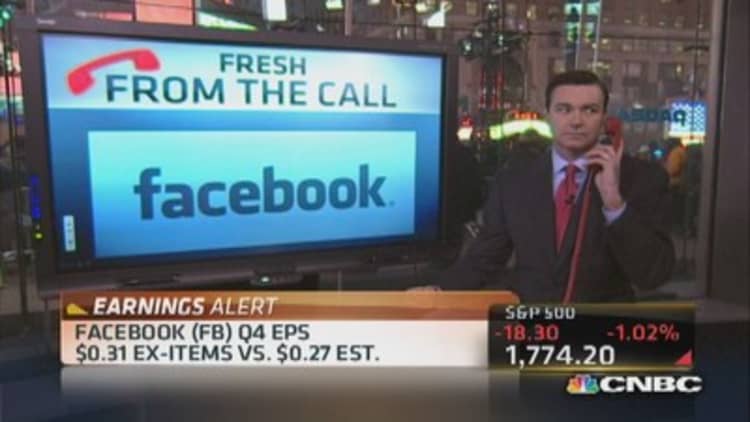Following better-than-expected results that saw Facebook's shares rise 12 percent after hours and indicated its investment in mobile and measurement is paying off, focus on the earnings call was on how the company will continue to grow its user base and increase revenue.
CEO Mark Zuckerberg kicked off the earnings call by laying out his vision for Facebook's future – this year, Facebook will launch a number of stand-alone mobile apps.
(Read more: 'Mobile shift is happening,' Facebook execs say)
"Connecting everyone means giving the power to share different kinds of content with different groups of people," Zuckerberg said. "This is something we focused on by launching separate mobile apps beyond the main Facebook app—messenger and Instagram are great examples of this."
Down the line this could see the emergence of the news reader app that Facebook's expected to launch, as well as more tools to share publicly, like Twitter. Facebook says that separate apps are working so far: Facebook Messenger has seen 70 percent growth over the last three months, while Instagram Direct offers new ways to share with individuals and groups.
In a related announcement, Thursday Facebook announced its highly-anticipated News Reader app called 'Paper,' which will be available for the iPhone in the US on February 3rd. It combines users' Facebook news feed with a choice of more than a dozen other sections on subject matter ranging from sports, to science, to design. It's already drawn rave reviews for its full-screen photos and auto play ads—it looks a bit like private news reader app Flipboard. And for now at least, there are no ads.
This past quarter was a tipping point for Facebook on the mobile front; for the first time more than half its advertising revenue—53 percent – came from mobile, while its mobile daily active users grew 49 percent from a year earlier to 556 million people. This was also the first time that Facebook reported over $1 billion in mobile revenue.
CFO David Ebersman said that the number of ads that Facebook is showing is down, because there are fewer ads on mobile devices. However, Facebook is able to charge more for mobile ads. Graph search, which has not yet launched on mobile devices, could be another source of revenue in the future.
(Read more: Facebook beats; stock jumps)
COO Sheryl Sandberg explained some ways that mobile usage growth could spell massive advertising growth. "When people are shopping in stores they are on their phones and when they are on their phones they are on Facebook," Sandberg said.
"A recent study by Miller Brown digital showed that while shopping in the store people who use Facebook do so at four times the rate of any other [app]. And for those people that use Facebook as a source for shopping over have stated that it was a very influential source of information for them while they were shopping in the store," she added.

Sandberg says her goal is to make Facebook ads as valuable to users as the rest of Facebook posts. The company has more than doubled the number of categories U.S. companies can target by. And the more marketers that get on board, the more likely a user will see a really useful ad.
"We are building the world's first global platform that lets marketers personalize their messages at unprecedented scale," Sandberg said. Continuing to invest in the measurement of ads will play into that virtuous circle, she added; by investing to understand more about in-store sales, they'll know which ads really work, and which ads are valuable to users, rather than a nuisance.
Facebook's executives deflected concerns about its popularity with younger teens. "We don't have any new data to report today," Ebersman said. "As you know we take engagement very seriously and we're focused on building great products that all our users including teens will find useful and engaging and that's the most important thing for us to stay focused on."
(Read more: )
Now that Facebook has 1.23 billion users, its growth is contingent on the company's ability to grow the world's access to the Internet. That's why in Zuckerberg's opening comments he talked about the company's work with Internet.org to connect everyone to the Internet.
"Helping more people get connected is important to developing a global knowledge economy," Zuckerberg said. "Once people are connected they can ask for tools like financial services, health information, and education tools to help them take care of their families and join the worldwide economy."
—By CNBC's Julia Boorstin. Follow her on Twitter: @JBoorstin.


